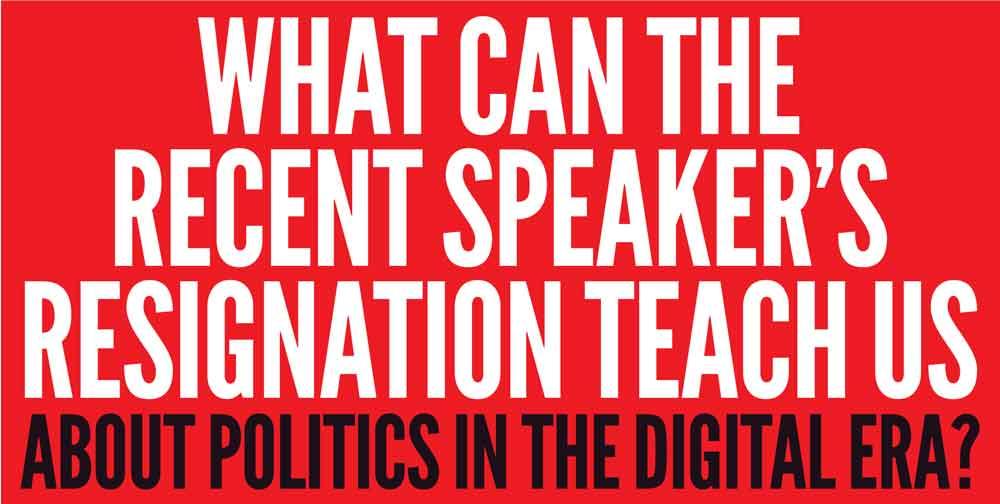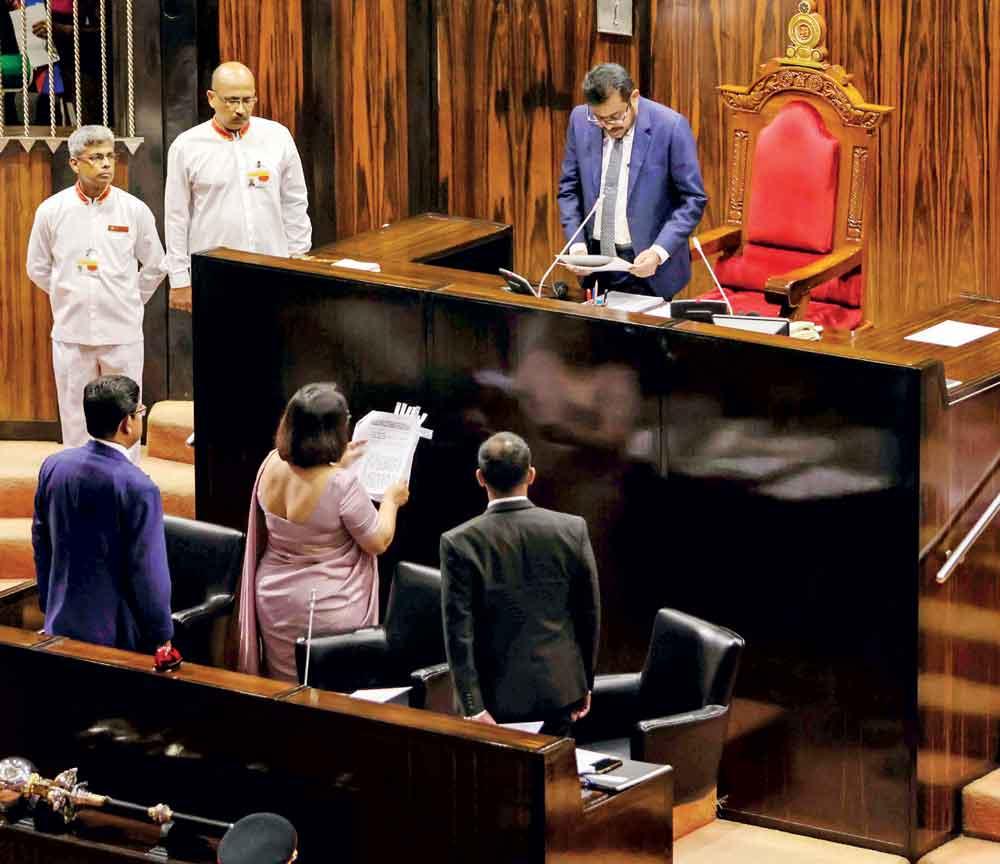


Asoka Ranwala remained Speaker of Parliament for only 22 days before he was forced to resign over his disputed educational qualifications
| People today are inundated with information, and that has pros and cons, especially in a democratic society |
With the advent of media and social media, people today are inundated with information, misinformation and disinformation, and this brings both advantages and disadvantages, especially in a democratic society. The instantaneous, regular flow of information has revolutionized the social order, with people better armed with information to make informed decisions and rationalize their choices. The flow of information helps build public opinion on a particular issue in a short period of time, and this keeps governments in constant check in the democratic world.
The rapid spread of information helped galvanize public opinion in 2021 and 2022 in Sri Lanka during the economic crisis, and ultimately enabled a powerful gathering of people to depose the then government of President Gotabaya Rajapaksa. Economic hardship affected almost every household in the country at the time, and public protest rallies that started as a trickle turned into a major show of force. As a result, he fled the country when protesters besieged his office. The flow of information in the digital age enabled the rapid mobilization of people. Sri Lanka was not unique in this case. It happened in many other parts of the world, with Bangladesh being the most recent example. Dissemination of information is a sharp tool in shaping, reforming and conditioning public opinion.
A recent example
In Sri Lanka, this acuity was again demonstrated when the former chairman, Asoka Sapumal Ranwala, resigned following mounting public criticism of his controversial educational qualifications, both on mainstream and social media. Unable to prove his academic qualifications with documents at this time, he submitted his resignation to President Anura Kumara Dissanayake who immediately accepted it. The JVP, the political party he represents, has announced his resignation to the press. It leaves room to believe that the party wanted him to resign, otherwise the party would be further humiliated in the public eye. Debate about merits and demerits is one thing. What is crucial here is that the government, the most powerful ever in Sri Lanka after independence, had to bow to the public pressure built by the media and fanned by the opposition. The government is formidable and has 71 percent of the seats in parliament. The country is still beaming after its huge victory in the November 14 general elections. The opposition is all too weak and is reeling from the consequences of defeat. Yet it sparked a public outcry through media and social media facilitation, forcing the chairman, the third highest ranking in terms of protocols, from his position.
His resignation underlines the fact that the rise of the media and social media has undoubtedly held governments to account. Moreover, it has transformed the dynamics of democratic societies, bringing both opportunities and challenges. In this particular case, with regard to Mr Ranwala, it has helped to strengthen voices against the ruling party, which finally swallowed the bitter pill and asked its member to resign from office rather than embarrass it or further to humiliate.
It again teaches a valuable lesson in democratic governance, with enthusiastic examples. Governments are now under constant surveillance in the world. Sri Lanka is no exception. Any protest against it can be amplified in a split second. When governing a country, political parties and bureaucrats must be extra careful in their actions and decisions. Their missteps can be politicized faster than they think. The stories are constantly changing on online platforms, leaving little room for delayed responses. It results in a rapid mobilization of public dissidents that can even cause a backlash.
Holding governments accountable
It helps hold governments around the world accountable. Governments are forced to be proactive in addressing or alleviating public concerns. In the past, governments were mainly held accountable through periodic elections. Nowadays, the media and social media ensure that accountability is an ongoing process. Governments are overthrown by people without waiting for elections.
Nevertheless, the very same tools that empower the citizenry can be used to spread false narratives or manipulate perceptions, with little time to counter them.
Today, governments face unwarranted public backlash based on unverified claims, leading to hasty policy decisions or a loss of focus on critical issues. Elements with vested interests can exploit platforms to spread propaganda, destabilize governments or influence elections.
Politicians today are pushed to tell the truth. For example, ruling party MP Nilanthi Kottahachchi is paying for what she noticed during the election campaign. Wherever she steps, she has become a laughing stock as the media questions her comments.
Misinformation about government policies or officials can damage public trust, even if it is unfounded.
In a multi-party democracy, the opposition will fuel its narrative, grounded or unfounded, against the ruling party. False stories often trump official clarifications. It will result in challenges for governing parties around the world.
Any protest against it can be amplified in a split second. When governing a country, political parties and bureaucrats must be extra careful in their actions and decisions. Their missteps can be politicized faster than they think
Governments of the contemporary world, in this era of information overload, misinformation and disinformation, are emphasizing modern fact-checking and regulatory mechanisms.
For people, media literacy and digital literacy are more important than ever. An in-depth study of the issues is absolutely important. Nowadays, on social media platforms, even complex issues are oversimplified and sometimes misinterpreted.
In modern democracies, ruling parties must be increasingly accountable and transparent, while taking proactive measures to counter misinformation and disinformation. Citizens with good media and digital literacy are fundamental for democratic governance to flourish.
Leave a Reply